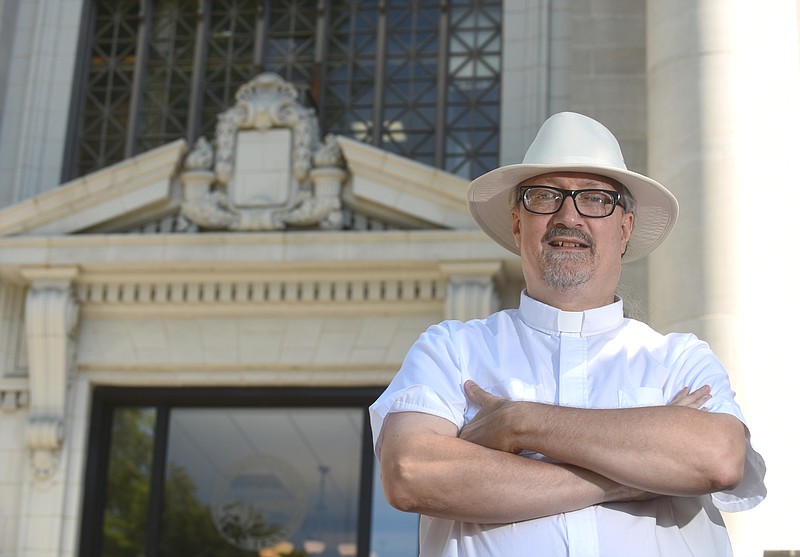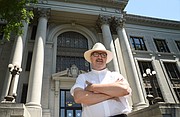In the year since the United States Supreme Court made a landmark decision legalizing gay marriage nationwide, the Technicolor wedding bells haven't stopped ringing - and the debate has kept raging.
Approximately 120,000 same-sex couples have said "I do" since the ruling came down, according to a recent Gallup poll. Out of that number, 141 were wed here in Hamilton County.
Also read...
* East Tennessee plaintiffs, others say equality fight not over after same-sex marriage ruling * Rainbow flags, images of shooting victims at pride parades
Susie Holloway, a business manager in the county clerk's office, said her office has been keeping track of gay marriages in the county since the ruling.
"To be honest, I didn't know what to expect," she said. "The first week the ruling came down, there were a few days we'd have four or five, and there was one day we had six."
Now, she said, it's business as usual and issuing a certificate to a gay couple is no different in her work than issuing one to a straight couple.
That reality has been a long time coming for the Rev. James Ramsey, an interfaith minister who advocated for years on behalf of the LGBT community, arguing for the rights of same-sex couples to marry.
He now regularly officiates those unions - 23 since June 2015.
"It's one of the main facets of my ministry," he said. "It's become about a quarter of the couples I see."
Ramsey was ordained through the Esoteric Interfaith Church in 1995 and now serves Crossvines Church, a ministry he calls "a church without walls."
He said he was surprised the ruling took so long to become the law of the land, but as national support for the measure grew steadily year after year, he knew it would happen eventually.
"It became more apparent that it was just a matter of time," he said.
But not everyone is happy about the Supreme Court ruling.
Rep. Mark Pody, R-Lebanon, sponsored legislation this year that he hoped would once again prohibit same-sex couples from being married in Tennessee.
According to Pody, the high court ruling trampled the state constitution. He pointed to voters' widespread support of a 2006 amendment declaring only marriage between a man and woman is legal.
"The bill that I did run I felt was only going to restore Tennessee's constitution," he said.
The Tennessee Natural Marriage Defense Act failed in subcommittee, even though Pody said there would have been enough votes to pass the bill had it made it to the floor, but that failure hasn't deterred him from picking up the issue in the future.
"I will be taking and relooking at this very issue and seeing how I can address it again because there will be new committee members, there will be new people that will be elected up there."
Although the Supreme Court has said the federal government is allowed to overrule individual state bans on same-sex marriages, Pody is adamant the state would have supremacy in this issue. According to Pody, the topic of marriage has always been defined constitutionally as an issue for the states to deal with.
Pody said that at the end of the day, his desire is for a return to the old status quo in Tennessee.
"I just want to go back to what it was one year ago."
Tennessee and Georgia were among the 13 states that banned gay marriage until the Supreme Court ruling. Many gay couples held out on marriage plans until they could make it official in their home states. Hamilton County was no different.
Even before the ruling, Ramsey assisted same-sex couples by performing commitment ceremonies. Such unions don't have the same legal standing as marriages.
Kat Cooper, executive director of the Nooga Diversity Project and speaker for the Tennessee Equality Project, married her wife in Maryland more than a year before the Supreme Court ruling. The high court's ruling left her with "happiness and sense of relief," she said.
"A fight that had been long fought by so many before my time, a fight I have dedicated my adult life to, had been won and victory was rightfully earned," Cooper said.
Cooper said she and her wife, like many same-sex couples throughout the nation, felt a sense of validation after the ruling. Their marriage has also given them options previously restricted to heterosexual married couples - like being able to speak for one another in medical emergencies.
"I was legally recognized as my wife's spouse; consequently, I was able to care for my wife in the hospital after her emergency cesarean, and I was able to make critical medical care decisions for her and for our twin baby boys when she was too sick to do so."
Even now, Cooper's infant son is clinging to life in a neonatal intensive care unit, but with both their names on his birth certificate, they are thankful they can both provide support to him and each other without legal hurdles.
But even as the right to marry has been extended to same-sex couples, it's come hand-in-hand with the same headaches that have always plagued the institution.
An employee in the Hamilton County Circuit Court Clerk's office said the office has handled multiple same-sex divorces this year. The exact number of divorces was unavailable.
Randy Davis, executive director for the Tennessee Baptist Convention, said he would support Pody's legislation. In his eyes, and in the eyes of the organization, heterosexual marriage is the only union supported by scripture.
Davis said churches in step with the convention will refuse to officiate same-sex weddings since they view homosexuality as a sin. However, he said he would gladly speak to same-sex couples with the same grace and kindness he would extend to anyone.
"I would be compassionate, not combative. I think you can be convictional and still be compassionate," he said.
For Davis, the most important thing is not winning a cultural war, but continuing to work as Christ instructed by being "salt and light."
As national support for the LGBT community continues to grow, Davis and other evangelicals are finding themselves part of a shrinking minority, but that's all right with him.
"The culture has never been our standard. The good news of the word of God is our standard," he said.
"I would say that if we're out of step with our culture, we find ourselves in some pretty good company."
Contact staff writer Emmett Gienapp at egienapp@timesfreepress.com or 423-757-6731.

